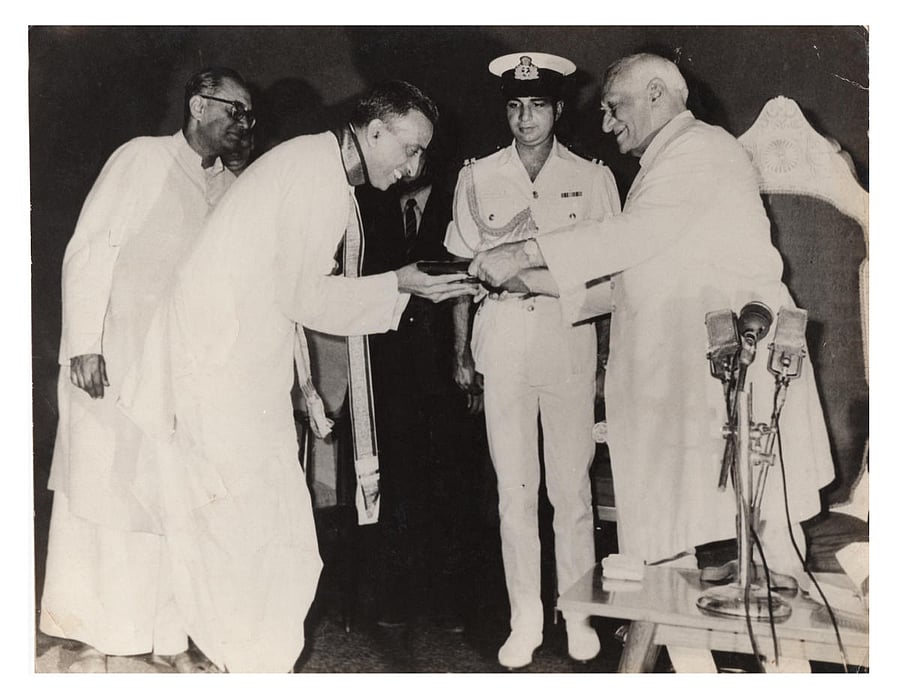
A two-day festival this weekend is part of a year-long celebration in honour of Mysore V Doreswamy Iyengar, a name synonymous with the veena in Karnataka.
Born in 1920, he was a master of the Mysuru style of veena playing. The centenary celebrations began on August 12.
Doreswamy Iyengar was elevated at the age of 13 as a court musician in the palace orchestra of Krishna Raja Wadiyar IV.
After Independence, in 1955, he was appointed music director at the Bengaluru station of the All India Radio. He held the post until 1980.
“He never allowed himself to stagnate. He was constantly active and evolving till his demise in 1997. He performed much more than his peers,” says D Balakrishna, his son and a veena vidwan himself.
Balakrishna says his father’s success came from his ability to adapt and create new techniques. He participated in many jugalbandis with such illustrious contemporaries in Hindustani music as Ustad Ali Akbar Khan.
Doreswamy Iyengar composed music for dance dramas, especially those of
P T Narasimhachar, the renowned Kannada poet. The AIR has multiple recordings in its archives.
“His admirers have already put up clips of his performances on YouTube,” he says.
Doreswamy Iyengar’s admirers plan to create an audio archive on a website dedicated to Doreswamy Iyengar.
“The veena holds a lot of possibilities. These possibilities are only uncovered
at the hands of a capable individual and Doreswamy was one,” says Prashanth Iyengar, veena vidwan and disciple of the master.
Balakrishna says that his father was a reluctant teacher. “I had to coax my mother to tell him every day, but he didn’t budge. Once when I was 12 or 13, my uncle saw how desperately I wanted to learn and convinced my father to teach me. It was only then that he agreed,” he recalls.
But he tended to be an impatient teacher, and Balakrishna had to observe and learn.
Doreswamy Iyengar had a quiet sense of humour. When he was awarded an honorary doctorate from the University of Mysore, he joked about how he had got it without writing a single exam.
Year-long celebrations
All year, the Veena Doreswamy Iyengar Memorial Trust is organising concerts featuring vocalists, flautists, and veena players.
Asked why the event wasn’t just about the veena, his son Balakrishna says, “My father gave importance to music of all kinds. Especially during his time in AIR, he gave opportunities to many up-and-coming artists. We want to continue that tradition.”
Veena player Prashanth Iyengar is at the helm of the trust.
Apart from the concert series, the trust is holding the third edition of the event ‘Veena Tattva Prakashika’, it will concentrate solely on the veena. From concerts to paper presentations that explore various aspects of the ancient instrument.
It will take place on November 23 and 24, from 9 am to 9 pm, at Ravindra Kalakshetra, JC Road. Entry is free.
Prashanth believes the veena must get its rightful place again.
“Nowadays Carnatic music is being celebrated only through vocal artists, and the space the veena has in concerts has decreased. Unless we celebrate the veena and its players, we will not be able to keep the instrument alive,” he says.
Mysore style of veena playing
According to D Balakrishna, the Mysore school blends vocal and instrumental techniques. The instrument should produce the nuances that vocal music can produce. “It should resemble the human voice, the veena should sing,” he says. In terms of finger technique, the strings should be plucked with the nails of the right hand. “No metal plectrum or clips are used as the strumming must be soft and pleasant,” he says. The middle and index finger must be used alternatively to ensure the continuity of sound.
The fingers on the left hand must be separated on the frets, unlike in other schools where they are held together: this helps play faster phrases.
Awards for Doreswamy Iyengar
Sangeetha Kalaratna from Bangalore Gayana Samaj in 1976.
Padma Bhushan in 1983.
Sangeeta Kalanidhi of the Madras Music Academy in 1984.
Sangeetha Kalasikhamani of the Indian Fine Arts Society in 1994.
Chowdiah National Award in 1997.